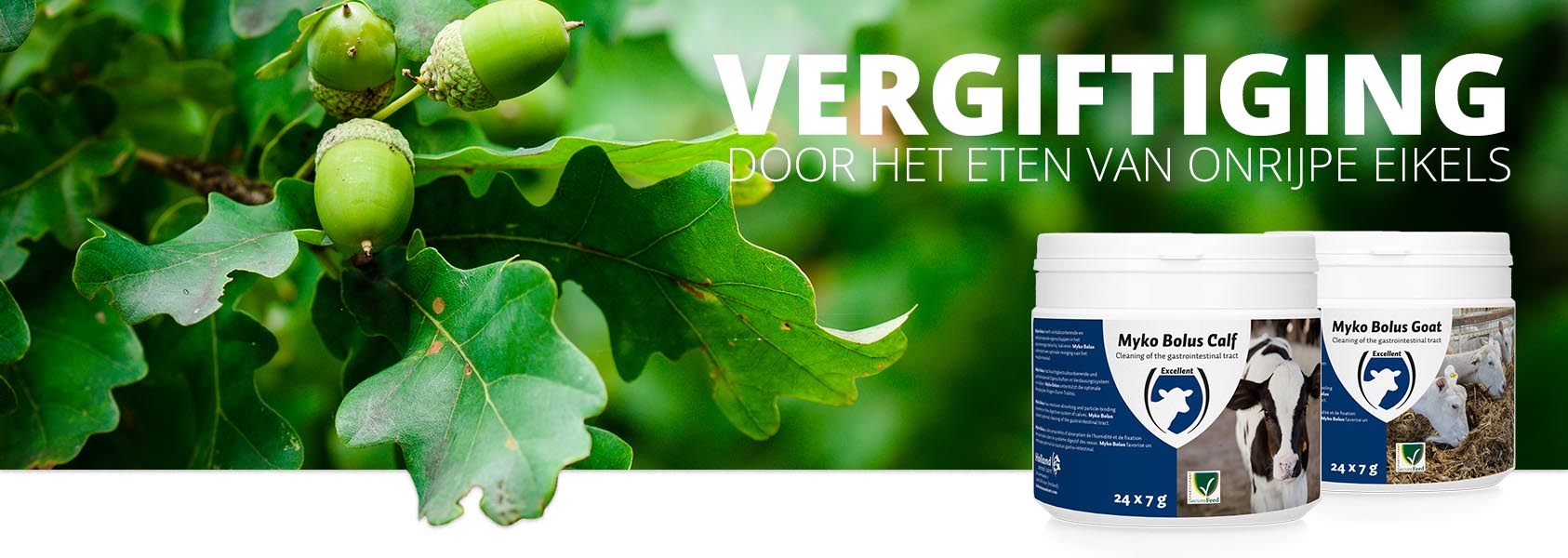Leesvoer (Rund)
- Laatste nieuws
- Leesvoer (Alpaca)
- Leesvoer (Honden & Katten)
- Leesvoer (Ongedierte)
- Leesvoer (Paard)
-
Leesvoer (Rund)
- Afrastering (Hoe werkt afrastering?)
- Boterzuurbacterie
- DCD Certificaat
- De Gelatineboli
- De invloed van biest op diarree bij kalveren.
- Fosforgebrek (P)
- Het belang van biest voor pasgeboren dieren
- Hittestress
- Klinische melkziekte
- Lang leve de koe!
- Mastitis & tepelcanules: welke, wanneer en hoe?
- Meten is weten
- Ontworming zonder kalender
- Slepende Melkziekte
- Uierverzorging
-
Vergiftiging door het eten van onrijpe eikels
- Vliegenbestrijding in de stal
- Vliegenbestrijding op vee
- Zomerdeken voor kalfjes
- Zomerwrang
- Zoutbehoefte
- Afrastering (jongvee)
- Diarree bij kalveren
- Selenium verstrekken
- Leesvoer (Schaap)
- Productintroducties
Vergiftiging door het eten van onrijpe eikels
De zomer is nog niet eens voorbij, maar het is nu alweer oppassen geblazen voor onrijpe, groene eikels en eikenblad. Deze zijn namelijk giftig voor dieren.
Vanwege de klimaatveranderingen vallen eikels steeds vroeger, met name tijdens storm of harde windvlagen.
Dieren zoals schapen, geiten, paarden en rundvee eten ze graag, zonder te weten hoe giftig het voor ze is. Paarden en rundvee eten vooral eikels als het aanbod aan gras of andere voedingsstoffen beperkt is. Maar ook honden eten af en toe eikels. Probeer dit te allen tijde te voorkomen; eikels zijn niet alleen zeer schadelijk voor honden, de scherpe puntjes kunnen ook inwendige schade aanrichten.
Eikelvergiftiging wordt veroorzaakt door de stof tannine, die zowel in de eikels als in het eikenblad zit. Hoe onrijper blad en eikel zijn, hoe hoger de concentratie is. Tannine wordt door het lichaam omgezet in giftige stoffen en beschadigt de binnenkant van de bloedvaten, nieren en darmen. In de darmen bindt tannine aan eiwit en ijzer, waardoor er een tekort aan deze stoffen ontstaat. Het darmslijmvlies trekt samen en de nieren lopen schade op.
In het minst ernstige geval krijgt het dier last van storingen in de spijsvertering. Verstopping en bloederige diarree zijn bijbehorende kenmerken.
Ziekteverschijnselen bij runderen
Het eerste klinische verschijnsel is traagheid. Het dier zondert zich af van de koppel en vreet onvoldoende, waarschijnlijk veroorzaakt door de ondertemperatuur van het lichaam. Andere mogelijke zichtbare verschijnselen zijn: versnelde ademhaling, bloederige neusvloeiing, buikpijn, bloederige diarree en sterfte.
Ziekteverschijnselen bij paarden
De tannine tast de maag-darmwand aan waardoor maagzweren, maag-darm verstoppingen en bloedarmoede kunnen ontstaan.
Het paard heeft een verminderde eetlust, koliekverschijnselen en donkergekleurde urine. Als het poetsen bij de buikstreek gevoelig is, kan dat wijzen op een eikelvergiftiging.
Ziekteverschijnselen bij schapen
Schapen zijn erg gevoelig voor eikelvergiftiging.
Ze worden onrustig, hebben een verminderde eetlust, krijgen last van verstoppingen, koliek, bloederige diarree en krijgen een dikke buik.
Ze hebben soms een stijve gang, waarna verlammingsverschijnselen op kunnen treden. Schapen drinken en urineren dan veel.
Het beste is om de dieren niet in een perceel te plaatsen waar veel eikels vallen. Zorg er voor dat dieren voldoende toegang hebben tot andere voedingsstoffen zoals een likblok of krachtvoer. Een tijdelijke afrastering of dieren overplaatsen naar een ander perceel kan ook een goede oplossing zijn.
Neem bij twijfel altijd contact op met uw dierenarts.





